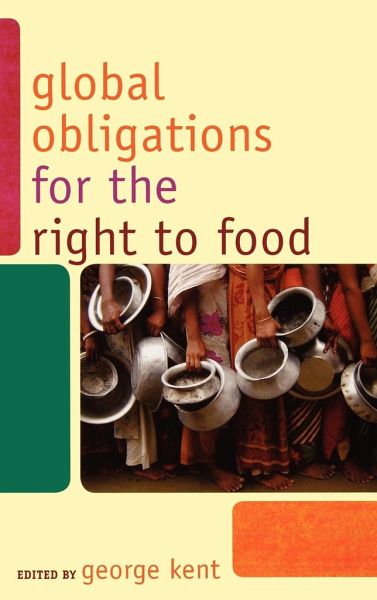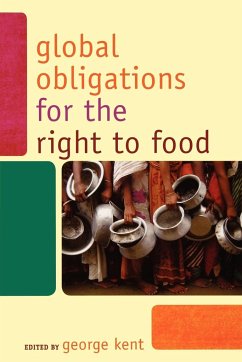
Gebundenes Buch
Global Obligations for the Right to Food
Versandkostenfrei!
Versandfertig in 1-2 Wochen
Weitere Ausgaben:

PAYBACK Punkte
69 °P sammeln!





A child may be born into a poor country, but not a poor world. If global human rights are to be meaningful, they must be universal. Global Obligations for the Right to Food assesses the nature and depth of the global responsibility to provide adequate food to the world's population.
George Kent is professor of political science at the University of Hawaii and he is the author of several books, including Freedom from Want: The Human Right to Adequate Food and Children in the International Political Economy.
Produktdetails
- Verlag: Rowman & Littlefield Publishers
- Seitenzahl: 274
- Erscheinungstermin: 17. Januar 2008
- Englisch
- Abmessung: 235mm x 157mm x 21mm
- Gewicht: 600g
- ISBN-13: 9780742560628
- ISBN-10: 0742560627
- Artikelnr.: 23108411
Herstellerkennzeichnung
Libri GmbH
Europaallee 1
36244 Bad Hersfeld
gpsr@libri.de
Global Obligations for the Right to Food offers an in-depth look at the urgent need for global responsibility. In this timely work, George Kent and a collection of experts address issues of corporate accountability, infant rights to food, and public access to seeds. As persistent inequalities lead to increasing levels of under nutrition on the one hand, and a growing pandemic of obesity on the other hand Global Obligations for the Right to Food brings much needed attention to this very complex issue. -- David Clark, Legal Officer Nutrition Section UNICEF, New York A must read for anyone interested in globalization, human rights, and the institutional and legal underpinnings of the world food and agriculture system, Global Obligations for
Mehr anzeigen
the Right to Food addresses the timely challenge to world leaders and key international institutions to ensure adequate food for all. -- Heather D. Gautney, Assistant Professor of Sociology, Fordham University and co-author of Implicating Empire: Globalization and Resistance in the 21 This multi-authored book, a project of a United Nations working group on Nutrition, Ethics, and Human Rights, discusses 'malnutrition in all its forms' with poverty and powerlessness as the primary focus. Topics include restrictions to public access to seeds, the marketing of calorie-dense, nutrient-poor foods that fuel obesity worldwide, and the need to make multinational food corporations accountable. Kent describes global inaction on malnutrition despite idealistic international declarations and shows how 'the net flow of food in international trade is from south to north: the poor feed the rich.' -- Jacquie Nutt, BSc, IBCLC Ilca Print and Multimedia Reviews, March 2009 Kent's book...pleads for greater institutional (national and UN-based) involvement in ensuring that the principles established in the right to food and the other charters and conventions that lay down human rights are put into practice in national law and international agreements. Food Magazine, March 2009 The book provides an excellent foundation for continuing the debate on global obligations for the right to food. It provides recommendations to global and UN actors, detailed legal justifications, case studies, successful examples of how countries hold corporations accountable, e.g. civil public action in Brazil or the Infant Milk Substitutes Act in India, and tools to be used at the international level to promote accountability and global responsibility. Journal Of Peace Education, March 2009 Each year on October 16, World Food Day reminds the world's population that the chief obstacle to the right to food is not famine caused by weather. It is political failure at every level-local, corporate, national, and international. In Global Obligations for the Right to Food, George Kent and his colleagues clarify the obligations at each of these levels to remedy the tragedies caused by political failure. -- Richard P. Claude, professor emertitus at University Maryland and author of Human Rights in the World Community: Issues and Action
Schließen
Für dieses Produkt wurde noch keine Bewertung abgegeben. Wir würden uns sehr freuen, wenn du die erste Bewertung schreibst!
Eine Bewertung schreiben
Eine Bewertung schreiben
Andere Kunden interessierten sich für













